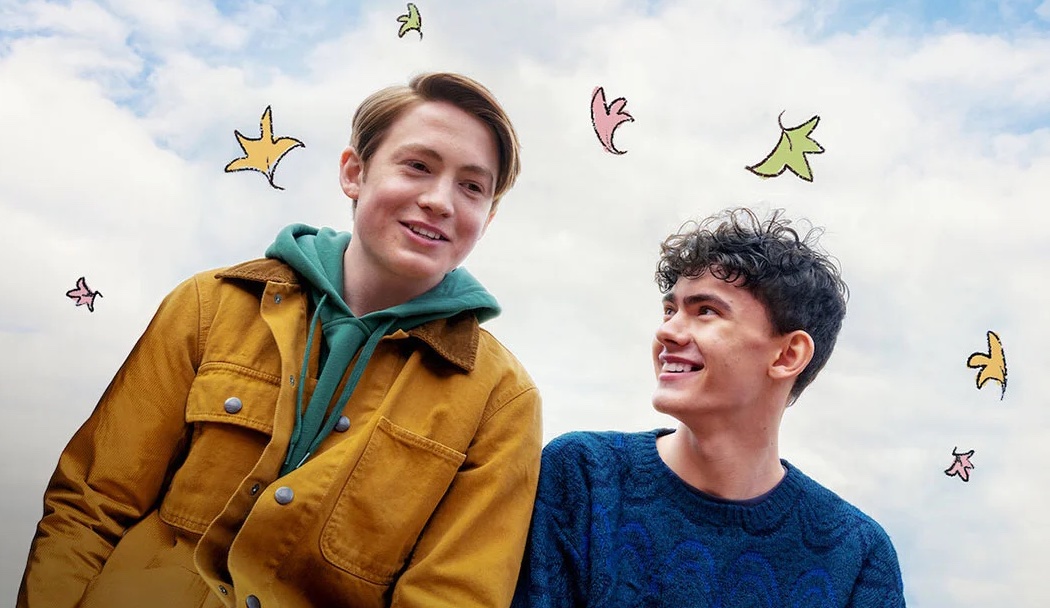The singular and transformative power of Heartstopper, Netflix’s loveliest boy-meets-boy romance, is not captured in the many scenes of unfolding affection between protagonists Charlie (Joe Locke) and Nick (Kit Connor), but rather in a heart-rending moment shared by Charlie and his older sister Tori (Jenny Walser).
Alone in his bedroom, curtains drawn and lights low, a long-faced Charlie reveals the depth of his sorrow and concludes: “Maybe I do just ruin people’s lives and it would be better if I didn’t exist.”
Tori pulls Charlie in close and holds him as tears stream down his face. “You’re not ruining my life,” she says.
In that moment, Tori holds generations of queer men who might have longed for their own innocent high school romance and benefitted from the affirmation of family and friends.
By conjuring a world where the bullied stand up to bullies, queer relationships don’t require the cloak of secrecy, and young people are surrounded by love and acceptance, Heartstopper has given the hurt teen inside this middle-aged man the hug he needed. And given the show’s arrival at this moment, when legislators in Florida have passed a “Don’t Say Gay” bill that prevents teachers and educators from being honest and frank with children about sexual orientation and gender expression, its influence, particularly on young people, could be profound.
The bullies started coming for me in middle school. The drama lessons and lack of coordination on the sports field may have put a bull’s eye on my back, but it was at Catholic school where l was fed the lie that my desires were sinful. I never stuck up for myself. I didn’t have the words or the confidence to stand my ground the way Charlie’s friend Tao (William Gao) does in a faceoff with sneering bully Harry Greene (Cormac Hyde-Corrin). I was so scared that what the bullies said about me was true that I didn’t dare tell an adult.
It’s taken me years to understand why.
“When we’re under psychological assault, our default position is surrender—we accept that this negative view of us must be true, and we adopt it as our own,” emotional intelligence expert Marc Brackett wrote in his 2019 book Permission to Feel. “Children do not have the inner strength or knowledge about people and their motivations to be able to say, ‘Who are you to define me? What gives you the right? Why do you need to belittle me? I reject you and your judgment of me—I know who I am.’ They need our unconditional support.”
I can only imagine how powerful and strong it would have felt to ask my tormenters such questions, though I realize my persistence, however diminished by those negative outside forces, was empowering in its own way. Survival itself is defiance.
There’s another character in Heartstopper, which is based on a series of bestselling graphic novels by 27-year-old Alice Oseman, I have to tell you about. Ben. He’s a year older than Charlie and far more self-loathing. Charlie is already out, while Ben is “figuring it out.” The two have carried on a relationship of sorts for some time, mostly comprised of secret meetings and stolen kisses in darkened library stacks. That is until Charlie decides he deserves more.
“You can’t even look at me when other people are around,” he tells Ben.
That hit home for me.
During the years between the sixth and twelfth grade, I had a sexual relationship with a friend that began one summer night during a sleepover at his house and carried on well into high school, long after the initial friendship withered.
The encounters happened in our bedrooms, in his basement, in the woods behind my house or sometimes over the phone. We went to separate high schools, which made it easier to keep the relationship under the radar. He was popular and passed as straight. I was easily, and often, picked out of a crowd as the boy most likely to be gay.
We weren’t boyfriends. It wasn’t love. I’m not sure to what degree we even liked each other or shared common interests beyond the first two Tori Amos albums. And yet, for years we shared a physical intimacy I hadn’t shared with anyone else. We did things with our bodies that I lacked the language or maturity to process with my heart or mind. Yes, I knew the words for each specific act and yes, I even enjoyed myself. I got off, and that probably added to my confusion and shame. Though in private, his hands had traced the lines and curves of my adolescent body, when our paths crossed in public, the most he’d muster was the slightest pursed-lip nod.
Looking back, that part was probably the most devastating. Like Charlie to Ben, I didn’t exist to him outside of the confines of a relationship shrouded in secrecy and shame, and that hurt deeply.
More than two decades passed before my friend and I spoke again after reconnecting on Instagram.
I told him things I’d wanted to say for years. How his behaviour back then made me feel and how it had taken me years to reckon with it. He listened intently and was not defensive.
He told me he knew he was not being a good friend to me. He told me he appreciated all the things he learned from me; the ways in which I introduced him to queer culture. He recalled our encounters were often dictated by me because they often happened at my house when no one else was home. The role reversal surprised me—I had never seen myself as the teacher or the one in control.
He told me he wished we could have been there for each other in high school.
We hung up after about 90 minutes and I exhaled. I didn’t cry, but what I felt in my body was like the relief one experiences after a good cry—shaking loose the crumbs on an emotional tablecloth.
The conversation, I concluded a few days later, changed nothing and everything. I am still prone to anxiety, doubt and worry. I still feel driven at times by a desire to overcompensate so people will like me. But some of the heaviness has lifted. The bogeyman he had become in my imagination over the years has been replaced by a more sympathetic, carefully rendered picture of a man who, like me, is trying his best to live a good and honest life free of the pains of his past.
I sent him a text last week to ask if he’d watched Heartstopper yet.
Holed up at home with a broken ankle, he’d watched all eight episodes.
“I cried all through the second half,” he said. “All young men deserve a first love like that. I’m just happy the show creators gave that to the young men of today. And I’m also grateful they gave it to us as well.”
What we see in Heartstopper is an antidote to all the bullying and negativity queer youth often face. We see straight friends defending queer friends and parents, in particular Charlie’s father and Nick’s mother (played by Oscar winner Olivia Colman), showing audiences what it is to love a child exactly as they are, and to hold them when they are hurting. We see Charlie’s friend Elle, who switched schools because of the transphobia she experienced, quickly falling in with new friends who never once blink an eye or ask the kinds of probing and inappropriate questions we might expect from adults coming up with anti-LGBTQ2S+ legislation in the U.S. to ask trans youth.
There’s even a wise and knowing art teacher whose classroom offers an island of salvation to Charlie, a place where he can eat his lunch in peace and escape the taunts. For me, that island was a portable where an English teacher who drove a sports car and liked Bruce Springsteen made me feel welcome. I didn’t have the courage to tell her why I spent so many lunch hours alone there, but I’d wager she knew.
Heartstopper is squeaky clean. The are flourishes of playful animation throughout that add to its youthful vibrancy and a charged energy whenever the young loves make physical contact (fear not parents of queer youth, it’s all very PG). And while the theme of bullying runs throughout, there’s a richness that allows the characters to rise above the pain and live their lives as normal kids who go bowling, play sports and have crushes.
Nick is described as a golden retriever in the show, but there’s depth there, too, in the way he explores the inner turmoil related to his sexuality before ultimately declaring himself bisexual. I welcome portrayals of young men being their best selves and defending others, even as they struggle with the tension between keeping up appearances and being true to themself.There’s fierce speculation online about whether a second season of Heartstopper is in the works. Part of me would welcome it, but another part of me also likes to just imagine Charlie and Nick out in the world, drunk on first love, unburdened by all the pain that marked so many queer men who came before them.


 Why you can trust Xtra
Why you can trust Xtra


